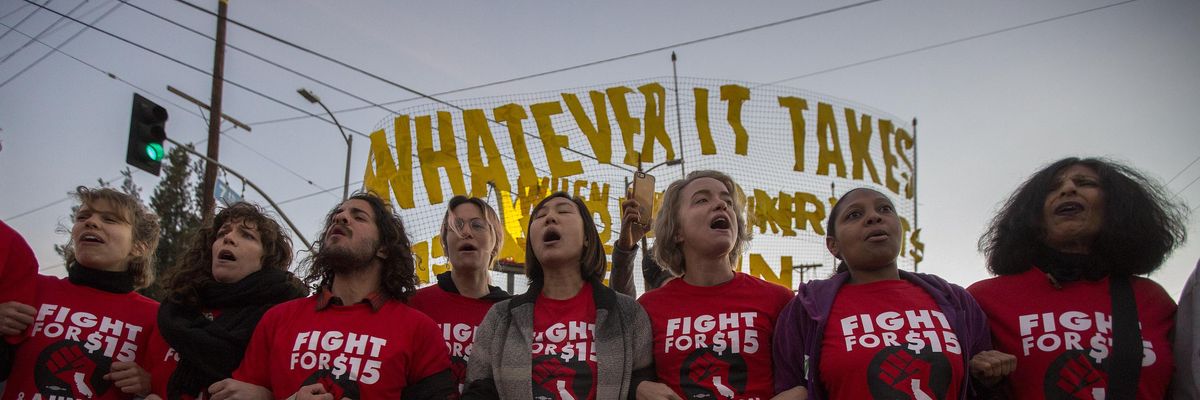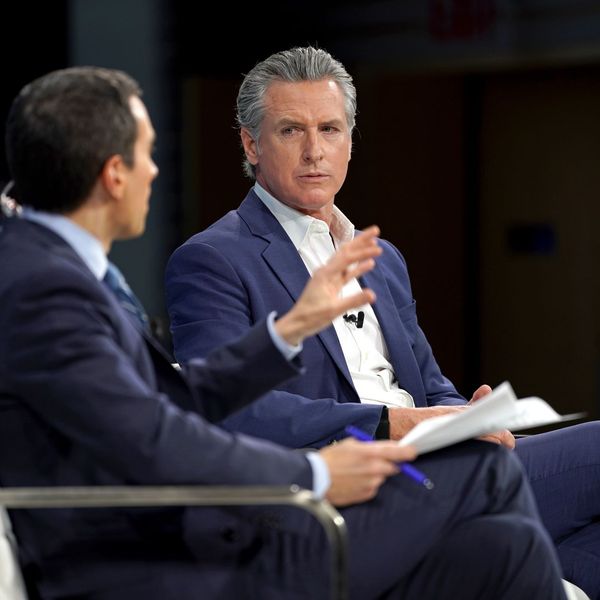
Striking McDonald's restaurant employees lock arms in an intersection before being arrested, after walking off the job to demand to demand a $15 per hour wage and union rights during nationwide 'Fight for $15 Day of Disruption' protests on November 29, 2016 in Los Angeles. (Photo: David McNew/Getty Images)
'Big News': Over 1 Million Signatures Gathered to Put $18 Min. Wage on California Ballot
"Raising the minimum wage in the Golden State is a moral imperative," says anti-poverty activist Joe Sanberg.
Advocates pushing to raise California's minimum wage to $18 an hour heralded a key development Thursday as they began submitting more than one million signatures to get the Living Wage Act on the November ballot, easily surpassing the roughly 623,000 required.
"We're going to set a new bar for working people all over the country."
"California Voters have been clear: people working full time should be able to afford life's basic needs," said anti-poverty activist Joe Sanberg, who filed the ballot initiative, in a statement.
The state's current minimum wage for employers, $15 an hour, was implemented just this year, though the wage drops to $14 an hour for companies with fewer than 26 employees.
Sanberg says the wage floor is clearly insufficient.
"Californians simply cannot afford to support a family on the current minimum wage--which amounts to just $32,000 a year for someone working full-time," he said. "Raising the minimum wage in the Golden State is a moral imperative."
If the Living Wage Act passes in November, it would increase the minimum wage incrementally, boosting it $1 per year until reaching $18 on January 1, 2025 for employers with 26 or more workers. Employers with fewer workers have an additional year to hit that minimum wage.
Thereafter, the minimum wage for all employees would also increase over time to keep pace with inflation and the cost of living.
Sanberg estimates that wage increase could mean an additional $6,420 per year for more than 5 million workers.
Beyond organizational backers like the California Faculty Association, Unite Here Local 11, and SEIU Local 87, the proposal appears to have strong public support.
Supporters of the ballot initiative point to a survey conducted last month of 1,200 likely voters in the state showing 76% in favor of raising the wage.
\u201cReally great news. With corporations making record profits, Californians deserve to earn a living wage for their labor. Full stop. #LivingWageAct\u201d— Steve Smith (@Steve Smith) 1652376274
"Raising the minimum wage," said California Labor Federation executive secretary-treasurer Art Pulaski, "is one of the strongest anti-poverty measures we have as a state."
"For low-wage workers, a higher minimum wage is life-changing," he said. "Better wages for workers also means they have more to spend at local businesses in our communities. If we're serious about combating poverty and reducing inequality, raising the minimum wage is an absolute necessity."
According to Sanberg, successful passage of the initiative could reverberate nationwide.
"Not only are we going to give 6M+ California workers a raise," he tweeted Thursday, "we're going to set a new bar for working people all over the country."
This article has been updated to correct Sanberg's reference of the Golden, not Gold, State.
An Urgent Message From Our Co-Founder
Dear Common Dreams reader, The U.S. is on a fast track to authoritarianism like nothing I've ever seen. Meanwhile, corporate news outlets are utterly capitulating to Trump, twisting their coverage to avoid drawing his ire while lining up to stuff cash in his pockets. That's why I believe that Common Dreams is doing the best and most consequential reporting that we've ever done. Our small but mighty team is a progressive reporting powerhouse, covering the news every day that the corporate media never will. Our mission has always been simple: To inform. To inspire. And to ignite change for the common good. Now here's the key piece that I want all our readers to understand: None of this would be possible without your financial support. That's not just some fundraising cliche. It's the absolute and literal truth. We don't accept corporate advertising and never will. We don't have a paywall because we don't think people should be blocked from critical news based on their ability to pay. Everything we do is funded by the donations of readers like you. Will you donate now to help power the nonprofit, independent reporting of Common Dreams? Thank you for being a vital member of our community. Together, we can keep independent journalism alive when it’s needed most. - Craig Brown, Co-founder |
Advocates pushing to raise California's minimum wage to $18 an hour heralded a key development Thursday as they began submitting more than one million signatures to get the Living Wage Act on the November ballot, easily surpassing the roughly 623,000 required.
"We're going to set a new bar for working people all over the country."
"California Voters have been clear: people working full time should be able to afford life's basic needs," said anti-poverty activist Joe Sanberg, who filed the ballot initiative, in a statement.
The state's current minimum wage for employers, $15 an hour, was implemented just this year, though the wage drops to $14 an hour for companies with fewer than 26 employees.
Sanberg says the wage floor is clearly insufficient.
"Californians simply cannot afford to support a family on the current minimum wage--which amounts to just $32,000 a year for someone working full-time," he said. "Raising the minimum wage in the Golden State is a moral imperative."
If the Living Wage Act passes in November, it would increase the minimum wage incrementally, boosting it $1 per year until reaching $18 on January 1, 2025 for employers with 26 or more workers. Employers with fewer workers have an additional year to hit that minimum wage.
Thereafter, the minimum wage for all employees would also increase over time to keep pace with inflation and the cost of living.
Sanberg estimates that wage increase could mean an additional $6,420 per year for more than 5 million workers.
Beyond organizational backers like the California Faculty Association, Unite Here Local 11, and SEIU Local 87, the proposal appears to have strong public support.
Supporters of the ballot initiative point to a survey conducted last month of 1,200 likely voters in the state showing 76% in favor of raising the wage.
\u201cReally great news. With corporations making record profits, Californians deserve to earn a living wage for their labor. Full stop. #LivingWageAct\u201d— Steve Smith (@Steve Smith) 1652376274
"Raising the minimum wage," said California Labor Federation executive secretary-treasurer Art Pulaski, "is one of the strongest anti-poverty measures we have as a state."
"For low-wage workers, a higher minimum wage is life-changing," he said. "Better wages for workers also means they have more to spend at local businesses in our communities. If we're serious about combating poverty and reducing inequality, raising the minimum wage is an absolute necessity."
According to Sanberg, successful passage of the initiative could reverberate nationwide.
"Not only are we going to give 6M+ California workers a raise," he tweeted Thursday, "we're going to set a new bar for working people all over the country."
This article has been updated to correct Sanberg's reference of the Golden, not Gold, State.
Advocates pushing to raise California's minimum wage to $18 an hour heralded a key development Thursday as they began submitting more than one million signatures to get the Living Wage Act on the November ballot, easily surpassing the roughly 623,000 required.
"We're going to set a new bar for working people all over the country."
"California Voters have been clear: people working full time should be able to afford life's basic needs," said anti-poverty activist Joe Sanberg, who filed the ballot initiative, in a statement.
The state's current minimum wage for employers, $15 an hour, was implemented just this year, though the wage drops to $14 an hour for companies with fewer than 26 employees.
Sanberg says the wage floor is clearly insufficient.
"Californians simply cannot afford to support a family on the current minimum wage--which amounts to just $32,000 a year for someone working full-time," he said. "Raising the minimum wage in the Golden State is a moral imperative."
If the Living Wage Act passes in November, it would increase the minimum wage incrementally, boosting it $1 per year until reaching $18 on January 1, 2025 for employers with 26 or more workers. Employers with fewer workers have an additional year to hit that minimum wage.
Thereafter, the minimum wage for all employees would also increase over time to keep pace with inflation and the cost of living.
Sanberg estimates that wage increase could mean an additional $6,420 per year for more than 5 million workers.
Beyond organizational backers like the California Faculty Association, Unite Here Local 11, and SEIU Local 87, the proposal appears to have strong public support.
Supporters of the ballot initiative point to a survey conducted last month of 1,200 likely voters in the state showing 76% in favor of raising the wage.
\u201cReally great news. With corporations making record profits, Californians deserve to earn a living wage for their labor. Full stop. #LivingWageAct\u201d— Steve Smith (@Steve Smith) 1652376274
"Raising the minimum wage," said California Labor Federation executive secretary-treasurer Art Pulaski, "is one of the strongest anti-poverty measures we have as a state."
"For low-wage workers, a higher minimum wage is life-changing," he said. "Better wages for workers also means they have more to spend at local businesses in our communities. If we're serious about combating poverty and reducing inequality, raising the minimum wage is an absolute necessity."
According to Sanberg, successful passage of the initiative could reverberate nationwide.
"Not only are we going to give 6M+ California workers a raise," he tweeted Thursday, "we're going to set a new bar for working people all over the country."
This article has been updated to correct Sanberg's reference of the Golden, not Gold, State.

